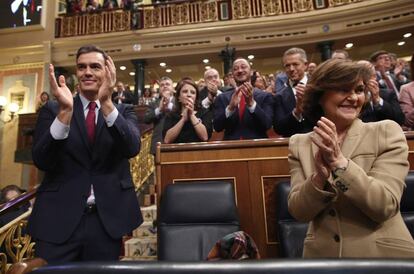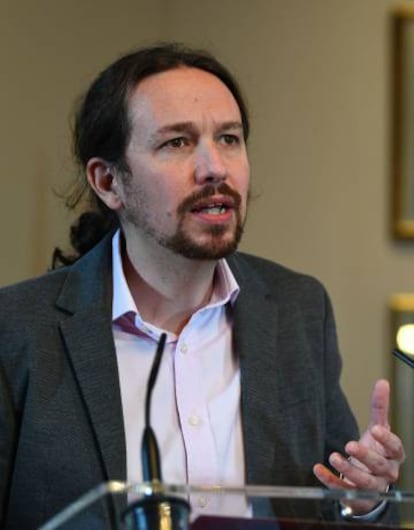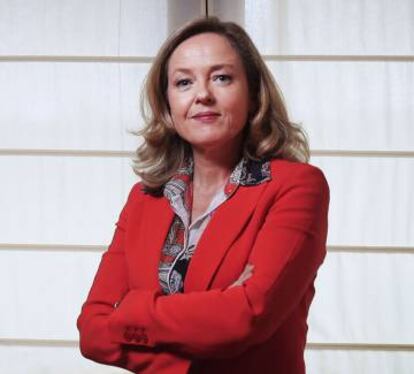Trickle of Cabinet announcements creates unease among Spain’s new coalition partners
The disclosure that PM Pedro Sánchez will have a fourth deputy in charge of environmental affairs came as a surprise to Unidas Podemos leader Pablo Iglesias

The first coalition government in modern Spain is already causing some friction among its partners.
On Thursday the newly confirmed prime minister, Pedro Sánchez of the Socialist Party (PSOE), announced his plans for a fourth deputy PM who will be in charge of environmental affairs.
Two governments do not make one government, they make zero governments
Alberto Núñez-Feijóo, Galician premier
The surprise decision – Sánchez was expected to have three direct deputies, not four – was not particularly welcomed by Unidas Podemos, Sánchez’s leftist coalition partner.
Podemos leader Pablo Iglesias is already slated to be a deputy PM in charge of social affairs and developing the goals of the United Nation’s 2030 agenda, which includes fighting poverty and the climate emergency. The creation of this new top position, to be headed by current Ecological Transition Minister Teresa Ribera, somewhat undermines Iglesias’ own responsibilities.
The announcement comes after Podemos on Monday released the names of its own party members who will hold government positions, a move that was not well received by the PSOE. Sánchez had originally been planning to announce the full lineup of his Cabinet sometime next week. On Wednesday, the PSOE and Unidas Podemos signed a 20-point document emphasizing the need for good internal communication to avoid the image of two executives working independently from each other.

Sánchez himself was only confirmed in office on Tuesday, when Congress endorsed him by a margin of two votes in a tight investiture vote that required support by smaller regional parties, including the separatist Catalan Republican Left (ERC). In return, Sánchez has agreed to hold talks with the Catalan government on the political situation in Catalonia, a move that the opposition conservatives have fiercely criticized.
The Popular Party (PP) has described Sánchez’s decision to have four deputies as a display of wastefulness. “That’s more advisors, more high-ranking positions, more official cars,” said Pablo Montesinos, the PP’s deputy communication secretary, in an interview on the television network La Sexta.
The regional premier of Galicia, Alberto Núñez Feijóo of the PP, also alluded to the fact that the names of Podemos’s ministers were released before those of the Socialist ministers. “The government could not have gotten off to a worse start,” he said. “Two governments do not make one government, they make zero governments.”
Main focus
During this new political term, Sánchez wants to focus efforts on four main areas: the economy, the environment, depopulated areas and social policy.
“Finally, depopulation has become a matter of state,” said Tomás Guitarte, the sole representative in Congress for a grassroots party named Teruel Existe that seeks to draw attention to the problems of rural Spain. Guitarte has been under police protection after receiving threats over his decision to vote for Sánchez at the investiture vote.

Carmen Calvo will repeat her position as the first deputy PM, while defining economic policy as well as Spain’s digital transformation will fall to Nadia Calviño, who has already been serving as economy minister since Sánchez came to power in June 2018 on the back of a no-confidence vote against then-PM Mariano Rajoy.
Pablo Iglesias and Teresa Ribera will hold the third and fourth deputy positions, while the current finance minister, María Jesús Montero, is becoming the new government spokesperson and finance minister.
The appointments of Montero and Calviño also aim to send out a message of stability to international markets: Calviño is well known abroad as she served for years at the European Commission, and she was one of the candidates to replace Christine Lagarde at the helm of the International Monetary Fund (IMF) last year.
The complete list of ministers will likely be made public sometime between Friday and Saturday, although Socialist sources have said that the former astronaut Pedro Duque will remain at the helm of the Science Ministry and Isabel Celaá will hold the education portfolio.
It also emerged on Friday that Arancha González Laya, who has worked as Assistant Secretary-General of the United Nations and the Executive Director of the International Trade Centre, will become foreign minister. José Luis Ábalos will be switching the Public Works Ministry for the Transport portfolio, while Fernando Grande-Marlaska will continue as interior minister. Margarita Robles will also hold on to her current role, in this case as defense minister. All of these ministers are from the PSOE.
Meanwhile, from the ranks of Unidas Podemos, Irene Montero will serve as equality minister, at 31, becoming the second-youngest female minister since Spain returned to democracy. Yolanda Díaz will head the Labor Ministry, and Alberto Garzón – the leader of the communist United Left party – will take the reins of the Consumer Affairs Ministry.
Sánchez will officially inform King Felipe VI about his new appointments on Sunday, and the first Cabinet meeting will take place on Tuesday.
English version by Susana Urra.
Tu suscripción se está usando en otro dispositivo
¿Quieres añadir otro usuario a tu suscripción?
Si continúas leyendo en este dispositivo, no se podrá leer en el otro.
FlechaTu suscripción se está usando en otro dispositivo y solo puedes acceder a EL PAÍS desde un dispositivo a la vez.
Si quieres compartir tu cuenta, cambia tu suscripción a la modalidad Premium, así podrás añadir otro usuario. Cada uno accederá con su propia cuenta de email, lo que os permitirá personalizar vuestra experiencia en EL PAÍS.
¿Tienes una suscripción de empresa? Accede aquí para contratar más cuentas.
En el caso de no saber quién está usando tu cuenta, te recomendamos cambiar tu contraseña aquí.
Si decides continuar compartiendo tu cuenta, este mensaje se mostrará en tu dispositivo y en el de la otra persona que está usando tu cuenta de forma indefinida, afectando a tu experiencia de lectura. Puedes consultar aquí los términos y condiciones de la suscripción digital.








































